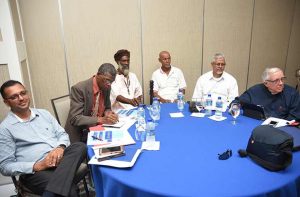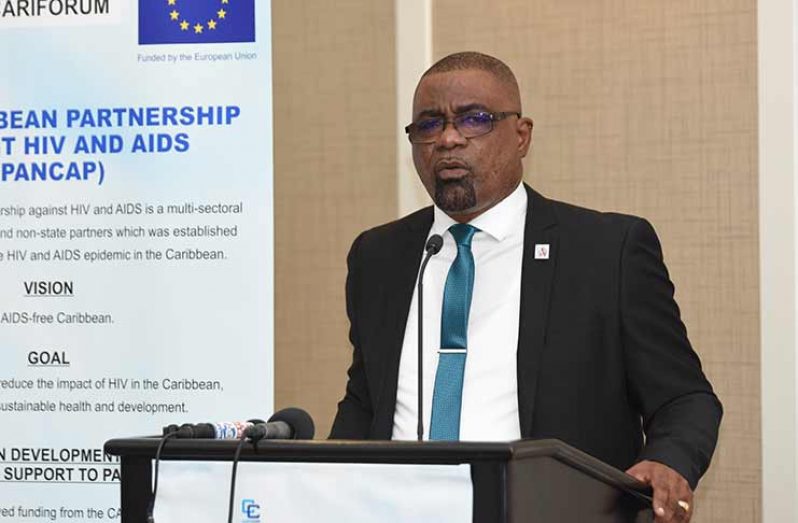… in order for Guyana to achieve 2030 health targets
WHILE it is understandable that the religious and Lesbian, Gay, Bisexual, and Transgender (LGBT) community in Guyana will have their disagreements, they must be willing to engage in respectful dialogue if the country is to achieve its 2030 health targets.
This is according to Director of the Pan Caribbean Partnership Against HIV/AIDS (PANCAP) Dereck Springer, who spoke to the Guyana Chronicle on the sidelines of the recently hosted National Faith Leaders Consultation.
Springer said that PANCAP is working to provide guidance on how such conversations can become a possibility in the wider Caribbean, as stigma and discrimination still remain a major barrier to the end of AIDS.
Quelling fears that exist, he stated that these arrangements for discussion do not involve either party being asked to relinquish their beliefs.
“It’s important to recognise that we have to respect religious doctrine. So public health is not attempting to say to the religious community that you have to change your doctrine. What we are trying to help the religious community to recognise is that if we are to end AIDS, we need everyone on board. We need the support of the faith community, because the faith community can address issues around prevention; the faith community can address issues around support,” he explained.
However, maintaining and instigating this dialogue have proven to be a challenge as the two groups do not see eye to eye on many issues.
During national consultations with religious leaders in the Caribbean over the years, PANCAP’s Anti-Discrimination Legislation has been seen as a means to do away with existing buggery laws that still remain in some states.
However, Springer clarified that the legislation speaks to discrimination in the broader sense, as the LGBT community represents only a part of the key populations PANCAP aims to protect from stigma and discrimination.

“Some people believe, when they hear a model Anti-discrimination legislation, that what it is speaking to is just sexual orientation. But, what it is speaking to is discrimination in general, discrimination on the grounds of gender, race, sexual orientation….discrimination across the board and how do we help people to recognise that if people feel discriminated against or stigmatised, they’re not going to be willing to come forward to get this free treatment that we have available to them,” Springer stated.
He later added: “Where the challenge has come about is because of the litigation where we have seen the successful litigation in Belize and Trinidad, so there is this fear that all the countries are going to be moving towards that.”
PANCAP’s eventual aim, however, is to ensure that all groups within key populations are emboldened to get themselves tested for HIV/AIDS, or to make themselves available to receive treatment for the disease.
This initiative forms a part of the UNAIDS 90-90-90 Target.
It indicates that if by 2020, 90 per cent of people living with HIV/AIDS are tested; 90 per cent of those tested are provided with access to treatment and 90 per cent of those treated have low levels of the virus in their blood, then it is possible to end aids by 2030.
To help achieve this, in 2013 PANCAP introduced its Justice For All (JFA) Programme as a regional response to the United Nations (UN) High Level Political Declaration to reduce AIDS-related stigma and discrimination.
In addition, a Regional Consultative Committee has been set up as a coordinating mechanism to promote and harmonise the implementation of national inter-religious programmes.
These, Springer explained, will help religious leaders to begin to understand the role they can play in ending the AIDS epidemic as stakeholders involved.
“Part of this discussion that we’re having here is once there is a national faith leaders response to HIV, they can seek to reach out to the various groups, including the LGBT community, to come in and to be able to share their perspective, because I think sometimes when we don’t give each other an opportunity to hear and to listen to each other, we continue to have the challenges,” he said.
Continuing on the topic, the PANCAP Director added: “We can disagree. We can’t expect everybody to agree on these particular issues, but how do we find a way to have those discussions in a respectful manner? Because when it is not respectful, what happens then is that it becomes a barrier to communication and engagement…once we can achieve respectful dialogue, it means that the faith leaders would not then feel that it’s a challenge to engage with the key populations and the key populations would not feel that it’s a challenge for them to engage with faith leaders.”




.jpg)









